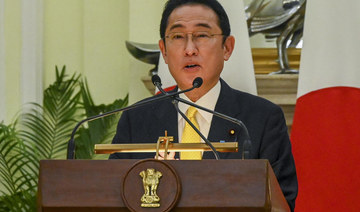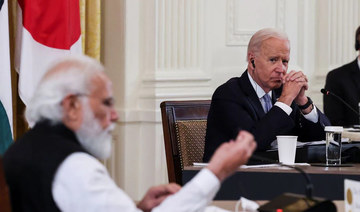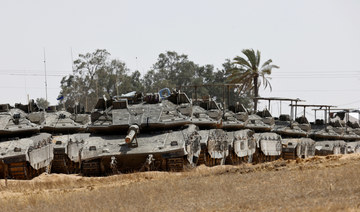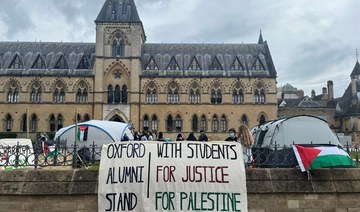LVIV/KYIV, Ukraine: Intense Russian air strikes are turning besieged Mariupol into the “ashes of a dead land,” the city council said on Tuesday, as the United States and Europe planned more sanctions to punish Moscow for its invasion of Ukraine.
Street fighting and bombardments raged in Mariupol, Ukrainian officials said, a day after it rejected an ultimatum from Russia to surrender. Hundreds of thousands are believed to be trapped inside buildings, with no access to food, water, power or heat.
Russian forces and Russian-backed separatist units had taken about half of the port city, normally home to around 400,000 people, Russia’s RIA news agency said, citing a separatist leader.
Street fighting was taking place in the city, and both civilians and Ukrainian troops were coming under Russian fire, said regional governor Pavlo Kyrylenko.
“There is nothing left there,” Ukrainian President Volodymyr Zelensky said in a video address to Italy’s parliament.
Mariupol Deputy Mayor Sergei Orlov told CNN the city was under a full blockade and had received no humanitarian aid.
“The city is under continuous bombing, from 50 bombs to 100 bombs Russian aircraft drops each day... A lot of death, a lot of crying, a lot of awful war crimes,” Orlov said.
Mariupol has become the focus of the war that erupted on Feb. 24 when Russian President Vladimir Putin sent his troops over the border on what he calls a “special military operation” to demilitarise Ukraine and replace its pro-Western leadership.
It lies on the Sea of Azov and its capture would allow Russia to link areas in the east held by pro-Russian separatists with the Crimean peninsula, annexed by Moscow in 2014.
Putin’s 27-day long incursion into Ukraine has forced more than 3.5 million to flee, brought the unprecedented isolation of Russia’s economy, and raised fears of wider conflict in the West unthought-of for decades.
Western nations plan to heap more economic pressure on the Kremlin.
US President Joe Biden will join allies in applying additional sanctions and tightening existing ones during his trip to Europe this week, national security adviser Jake Sullivan said on Tuesday.
The trip will also include an announcement on joint action to enhance energy security in Europe, which is highly reliant on Russian gas, and Biden will show solidarity with Ukraine’s neighbor, Poland, with a visit to Warsaw.
Having failed to seize the capital Kyiv or any other major city with a swift offensive, Russia is waging a war of attrition that has reduced some urban areas to rubble and prompted Western concern that the conflict could escalate, even to a nuclear war.
Russia’s security policy dictates that the country would only use such weapons if its very existence were threatened, Kremlin spokesman Dmitry Peskov told CNN on Tuesday.
“If it is an existential threat for our country, then it (the nuclear arsenal) can be used in accordance with our concept,” he said.
Earlier he said “no one” had ever thought the operation in Ukraine would take just a couple of days and the campaign was going to plan, TASS news agency reported.
’HUMANITARIAN CATASTROPHE’
The United Nations human rights office in Geneva said on Tuesday it had recorded 953 civilian deaths and 1,557 injured since the invasion. The Kremlin denies targeting civilians.
Western officials said Russian forces were stalled around Kyiv but making some progress in the south and east. Ukrainian fighters are repelling Russian troops in some places but cannot roll them back, they said.
A Reuters team that reached a Russian-seized part of Mariupol on Sunday described a wasteland of charred apartment blocks and bodies wrapped in blankets lying by a road.
Ukraine says Russian shells, bombs and missiles have struck a theater, an art school and other public buildings, burying hundreds of women and children sheltering in cellars.
Deputy Prime Minister Iryna Vereshchuk, speaking on Ukrainian television on Tuesday, demanded the opening of a humanitarian corridor for civilians. She said at least 100,000 people wanted to leave Mariupol but could not.
Referring to Russia’s earlier demand that the city surrender by dawn on Monday, Vereshchuk said: “Our military are defending Mariupol heroically. We did not accept the ultimatum. They offered capitulation under a white flag.”
Kyiv accused Moscow of deporting residents of Mariupol and separatist-held areas of Ukraine to Russia. This includes the “forcible transfer” of 2,389 children to Russia from the Luhansk and Donetsk regions, Prosecutor General Iryna Venediktova said.
Moscow denies forcing people to leave, saying it is taking in refugees.
In Kherson, a city under Russian control, Ukrainian officials said Moscow’s forces were preventing supplies from reaching civilians.
“Kherson’s 300k citizens face a humanitarian catastrophe owing to the Russian army’s blockade,” foreign ministry spokesperson Oleg Nikolenko said on Twitter.
Russia did not immediately comment on the situation in Kherson.
Zelensky warned the crisis in Ukraine, one of the world’s biggest grain exporters, would bring famine elsewhere.
“How can we sow (crops) under the strikes of Russian artillery?” he told Italian lawmakers.
In an address overnight, he also drew attention to the death of Boris Romanchenko, 96, who survived three Nazi concentration camps during World War Two but was killed when his apartment block in besieged Kharkiv was shelled last week.
In killing Romanchenko, “Putin managed to ‘accomplish’ what even Hitler couldn’t,” Ukraine’s Defense Ministry said.
Russian strikes turning Mariupol into ‘ashes’ as West plans more sanctions
https://arab.news/27f7j
Russian strikes turning Mariupol into ‘ashes’ as West plans more sanctions
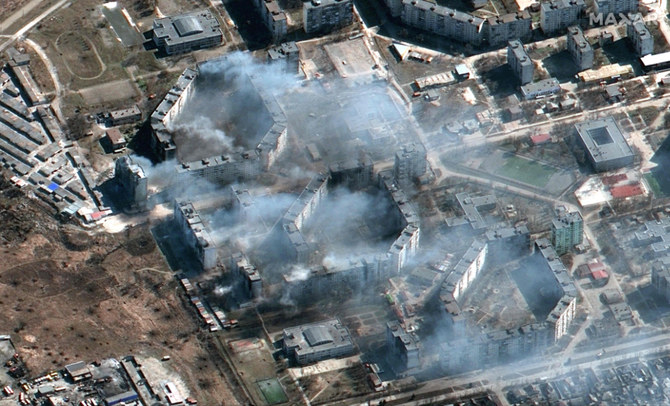
- The governor of Donetsk region, Pavlo Kyrylenko, said street fighting was taking place there
- Western officials said on Tuesday Russian forces were stalled around Kyiv but making some progress in the south and east
Ground invasion of Rafah would be ‘intolerable,’ UN chief warns

- Israel has killed more than 34,700 Palestinians, around two-thirds of them children and women, according to Gaza health officials
UNITED NATIONS, United States: A ground invasion of Rafah would be “intolerable,” UN Secretary-General Antonio Guterres said Monday, calling on Israel and Hamas “to go an extra mile” to reach a ceasefire deal.
“This is an opportunity that cannot be missed, and a ground invasion in Rafah would be intolerable because of its devastating humanitarian consequences, and because of its destabilizing impact in the region,” Guterres said as he received Italian President Sergio Mattarella.
UK military personnel’s data accessed in hack, BBC reports

- MPs could be informed about the development in the Commons on Tuesday
Some personal information in a payroll system used by Britain’s defense department has been accessed in a data breach, the BBC reported on Monday.
The system was managed by an external contractor and no operational Ministry of Defense data was obtained, the broadcaster said, adding that the department took the system off-line immediately.
Information like names and bank details of current and some former members of the Royal Navy, Army and Air Force was compromised, according to the report.
The Ministry of Defense did not immediately respond to a Reuters’ request for comment outside working hours.
MPs could be informed about the development in the Commons on Tuesday, the report added.
Russia says it takes control of two more settlements in eastern Ukraine
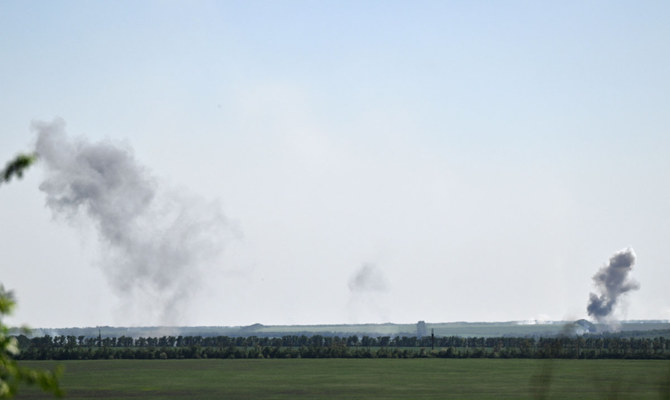
- Russia has made slow but steady advances since taking Avdiivka in February, with a string of villages in the area falling to Moscow’s forces
MOSCOW: Russian forces have taken control of the settlements of Soloviove in Ukraine’s eastern Donetsk region and Kotliarivka further north in the Kharkiv region, the defense ministry said on Monday.
Ukraine’s military made no mention of either locality in its evening General Staff report. Kharkiv Regional Governor Oleh Syniehubov said on Monday that Kotliarivka, located near the town of Kupiansk, was one of several locations to come under Russian shelling.
But Ukrainian bloggers appeared to acknowledge that both villages were in Russian hands.
DeepState, a popular forum on the war, noted on Saturday that Kotliarivka had been captured by Russian forces and on Sunday said the neighboring village of Kyslivka was also in Russian hands.
DeepState reported that Soloviove, northwest of the Russian-held town of Avdiivka, had been taken by Russian forces last week.
Russia has made slow but steady advances since taking Avdiivka in February, with a string of villages in the area falling to Moscow’s forces.
UNICEF warns 600,000 children face ‘catastrophe’ in Rafah
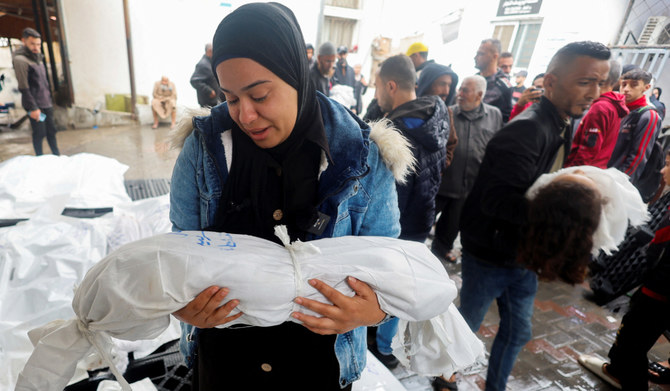
- Calling again for a ceasefire and safe access for humanitarian organizations, the agency highlighted there are some 78,000 infants under age two sheltering in the city, along with 175,000 children under five who are affected by infectious disease
- Israel has killed more than 34,000 Palestinians in Gaza, mostly women and children, according to the health ministry in the Hamas-run territory
NEW YORK: Some 600,000 children packed into Gaza’s Rafah city face “further catastrophe,” UNICEF warned on Monday, urging against their forced relocation after Israel ordered an evacuation ahead of its long-threatened ground invasion.
“Given the high concentration of children in Rafah ... UNICEF is warning of a further catastrophe for children, with military operations resulting in very high civilian casualties and the few remaining basic services and infrastructure they need to survive being totally destroyed,” the UN children’s agency said in a statement.
It said Gaza’s youth were already “on the edge of survival,” with many in Rafah — where the agency said the population has soared to 1.2 million people, half of them children — already displaced multiple times and with nowhere else to go.
“More than 200 days of war have taken an unimaginable toll on the lives of children,” said UNICEF Executive Director Catherine Russell.
“Rafah is now a city of children, who have nowhere safe to go in Gaza,” she said, warning that a large-scale military operation by Israel would bring “chaos and panic, and at a time where (children’s) physical and mental states are already weakened.”
UNICEF estimates that Rafah’s population has swelled to nearly five times its normal figure of 250,000 residents.
Calling again for a ceasefire and safe access for humanitarian organizations, the agency highlighted there are some 78,000 infants under age two sheltering in the city, along with 175,000 children under five who are affected by infectious disease.
Gaza’s bloodiest-ever war began following Hamas’s unprecedented Oct. 7 attack on Israel.
Israel has conducted a retaliatory offensive that has killed at least 34,735 people in Gaza, according to the Hamas-run
territory’s Health Ministry.
Of that toll, more than 14,000 are children, the ministry has said.
Israeli Prime Minister Benjamin Netanyahu has vowed to send ground troops into Rafah regardless of any truce, despite concerns from the US, other countries, and aid groups.
Hamas official Izzat Al-Rashiq said in a statement that any Israeli operation in Rafah would put the truce talks in jeopardy.
Senior Hamas official Sami Abu Zuhri said the evacuation order was a “dangerous escalation” that would have consequences.
“The US administration, alongside the occupation, bears responsibility for this terrorism,” the official said.
Hamas said later in a statement that any offensive in Rafah would not be a “picnic” for Israeli forces and said it was fully prepared to defend Palestinians there.
Aid agencies have warned that the evacuation order will lead to an even worse humanitarian disaster in the crowded coastal enclave of 2.3 million people reeling from seven months of war.
“Forcing 1 million displaced Palestinians from Rafah to evacuate without a safe destination is not only unlawful but would lead to catastrophic consequences,” British charity ActionAid said.
Nick Maynard, a British surgeon trying to leave Gaza on Monday, said in a voice message from the Gaza side of the Rafah crossing into Egypt: “Two huge bombs have just gone off immediately outside the crossing. There’s a lot of gunfire as well about 100 meters from us. We are very unclear whether we will get out.”
“Driving through Rafah, the tension was palpable with people evacuating as rapidly as they could.”
Witnesses said the areas in and around Rafah where Israel wants to move people are already crowded with little room for more tents.
“The biggest genocide, the biggest catastrophe, will take place in Rafah. I call on the whole Arab world to interfere for a ceasefire — let them interfere and save us from what we are in,” said Aminah Adwan, a displaced Palestinian.
Israel has been threatening to launch incursions in Rafah, which it says harbors thousands of Hamas fighters and potentially dozens of hostages.
Victory is impossible without taking Rafah, it says.
New York’s Columbia University cancels graduation ceremony as students remain defiant

- Pro-Palestinian protests put paid to event planned for May 15
NEW YORK: New York’s prestigious Columbia University has announced that it is canceling its main graduation ceremony, scheduled for next week, because of ongoing pro-Palestinian protests.
The announcement on Monday is the latest development in a movement that began nearly three weeks ago at Columbia and has swept college campuses nationwide.
The graduation ceremony had been scheduled for May 15 on the south lawn of the Manhattan campus, where protest encampments had been based before authorities dismantled them last week.
The Ivy League institution said it would “forego the university-wide ceremony” and hold a series of smaller events instead.
“We are determined to give our students the celebration they deserve, and that they want,” Columbia announced, saying “smaller-scale, school-based celebrations are most meaningful to them and their families.”
The university added: “We will focus our resources on those school ceremonies and on keeping them safe, respectful, and running smoothly. A great deal of effort is already underway to reach that goal.”
Students across the US have protested and set up tents at dozens of universities to register their opposition to the war in Gaza, while calling on President Joe Biden to do more to stop the bloodshed.
They have also demanded their institutions cease supporting companies that support Israel’s government.
Maya James, a psychology student at Columbia, told Arab News: “Seeing the university’s really insane response to student protests has brought so many people together, because I feel like most people on this campus can agree, including faculty, that students should not be penalized for expressing their First Amendment rights to protest, to petition, to do all of these things we’ve been encouraged to do for so long.”
She called on the university to give amnesty to students who had been suspended for expressing their First Amendment rights, which protect freedom of speech, the press, assembly, and the right to petition.
James also called on the university to disclose its investments because as “of right now there’s no visibility for us students to be able to know what the university is expected to do.”
She described the “vibes” at the protest sites as “absolutely remarkable,” with cultural and educational programs being offered and all kinds of activities being held.
She said the demonstrations were a continuation of Columbia’s long tradition of protest which began in the 1960s with its opposition to the involvement of the US in the Vietnam War.
James said it was “incredible” to see the solidarity for the Palestinian cause spread in campuses across the US, and people pushing to ensure “that we do indeed see a free Palestine within our lifetime and that our universities are no longer complicit in the genocide.”
Demonstrators have gathered on at least 40 US university campuses since April 17, often erecting tent camps to protest against the soaring death toll in the Gaza Strip. Nearly 2,000 people have been detained, according to the US media.
Police officers have forcibly ended several student sit-ins in recent days, including one at New York University at the request of its administrators.
Demonstrators had barricaded themselves inside Columbia, the epicenter of student protests in New York, and some complained about police brutality when officers cleared the faculty.
(With Agencies)



